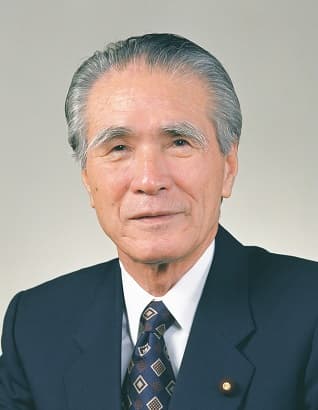Japan’s former Prime Minister Tomiichi Murayama, who made an historic apology for atrocities committed during Japan’s imperial rule over large swathes of Asia in the early 20th century and during World War II, died Friday Oct. 17, aged 101.
Cardinal Isao Kikuchi of Tokyo said Murayama “will be remembered for his moral courage in leading Japan to confront its wartime past with honesty and humility, and for his clear commitment to peace and reconciliation being honest to past history.”
Murayama served as Japan’s Prime Minister from 1994-1996 and was the country’s first Socialist Prime Minister since Tetsu Katayama briefly held power between 1947 and 1948.
His time in office saw several traumatic events, including a Jan. 17, 1995 earthquake that claimed at least 5,000 lives, the Mar. 20, 1995, sarin gas attack on the Tokyo subway system carried out by by members of the Aum Shinrikyo cult, which kiled 13 people and injured 6,300 others, and the related June 21, 1995 hijacking of Al Nippon Flight 857, in which the hijacker demanded release of the Aum Shinrikyo leader, who had been arrested in the wake of the deadly March attack (and would be tried, convicted, imprisoned, and executed on July 6, 2018).
Murayama coordinated the responses to each incident, earning praise for his leadership, but a condition of his coalition government with Japan’s Liberal Democratic Party was a rotational premiership. Murayama resigned in January 1996, in keeping with the coalition agreement, and retired from politics in 2000.
In 1995, however, after painstaking consultation and drafting, Murayama issued his historic statement on the 50th anniversary of Japan’s unconditional surrender to allied forces.
“During a certain period in the not-too-distant past,” the statement said, “Japan, following a mistaken national policy, advanced along the road to war, only to ensnare the Japanese people in a fateful crisis, and, through its colonial rule and aggression, caused tremendous damage and suffering to the people of many countries, particularly to those of Asian nations.”
“In the hope that no such mistake be made in the future,” the Murayama statement continued, “I regard, in a spirit of humility, these irrefutable facts of history, and express here once again my feelings of deep remorse and state my heartfelt apology.”
The Murayama Statement also acknowledged Japan’s status as the only nation against which atomic weapons have been deployed in war.
“[A]s the only country to have experienced the devastation of atomic bombing, Japan, with a view to the ultimate elimination of nuclear weapons, must actively strive to further global disarmament in areas such as the strengthening of the nuclear non-proliferation regime,” the Murayama Statement said.
“It is my conviction that in this way alone can Japan atone for its past,” Murayama said, “and lay to rest the spirits of those who perished.”
Kikuchi said Murayama’s 1995 statement “continues to serve as a moral touchstone for those who believe that true peace must be built upon truth and repentance.”
“We must not forget nor change the history,” Kikuchi told Crux, “but we have to learn from the past.”
Kikuchi also recalled the “profound compassion” Murayama showed victims of the Jan. 17, 1995 Hanshin-Awaji earthquake, saying he recalled Murayama “standing close to those who suffered and striving to respond with humanity and solidarity.”
Murayama’s response to the quake received criticism at the time as too slow and his deployment of Self Defense Forces in the recovery effort was a subject of controversy, but Japan eventually changed its law to allow for the use of SDF in similar critical situations, while Murayama’s management of reconstruction efforts and closeness to victims received praise.
“That deep empathy,” Kikuchi said, “reflected [Murayama’s] genuine respect for the dignity of every human.”
“The Catholic Church shares this same conviction,” Kikuchi said. “[M]emory, reconciliation, and compassion form the heart of a just and peaceful society.”
“The Catholic bishops of Japan have been emphasizing that we must inherit memory and not exclude anyone in society, while protecting all life,” Kikuchi also said.
“In this light,” Kikuchi continued, “Mr. Murayama’s integrity and his dedication to peace resonate deeply with the spirit of the Gospel.”
“We need a sincere person with a heart of compassion like him as our leader in today’s Japan,” Kikuchi said.
Murayama died at a hospital in his home town of Oita, on the island of Kyushu, in Japan’s southwest.














